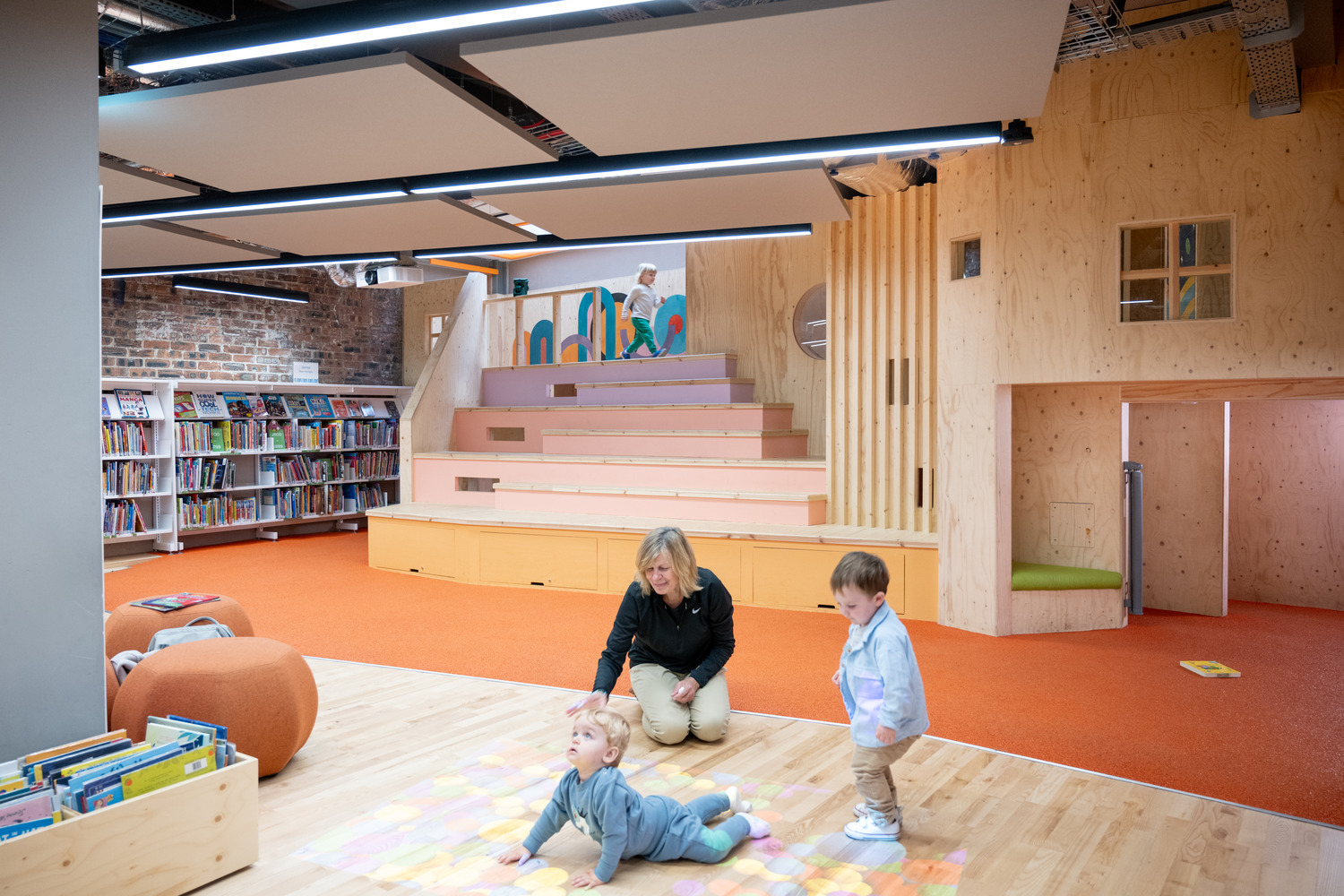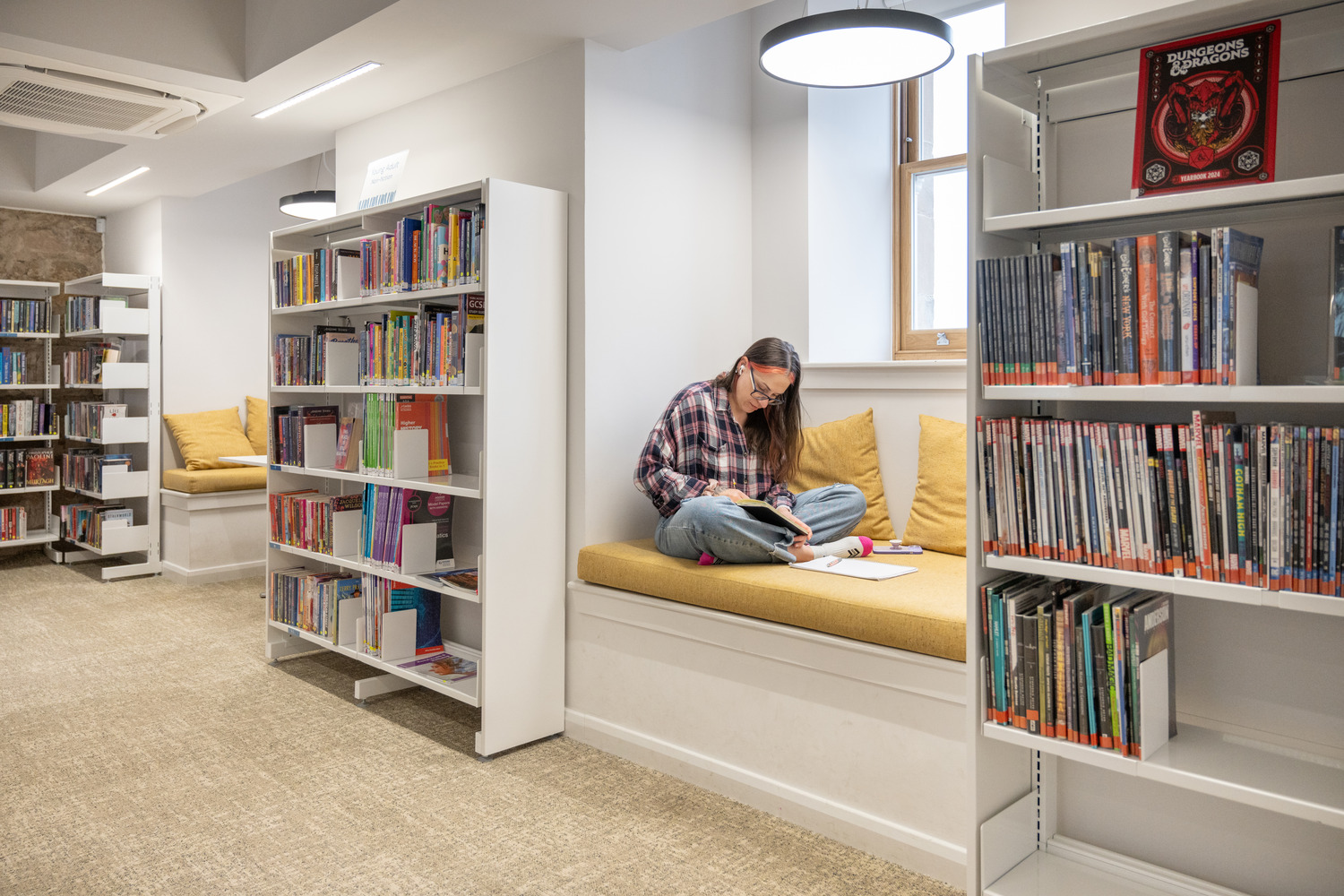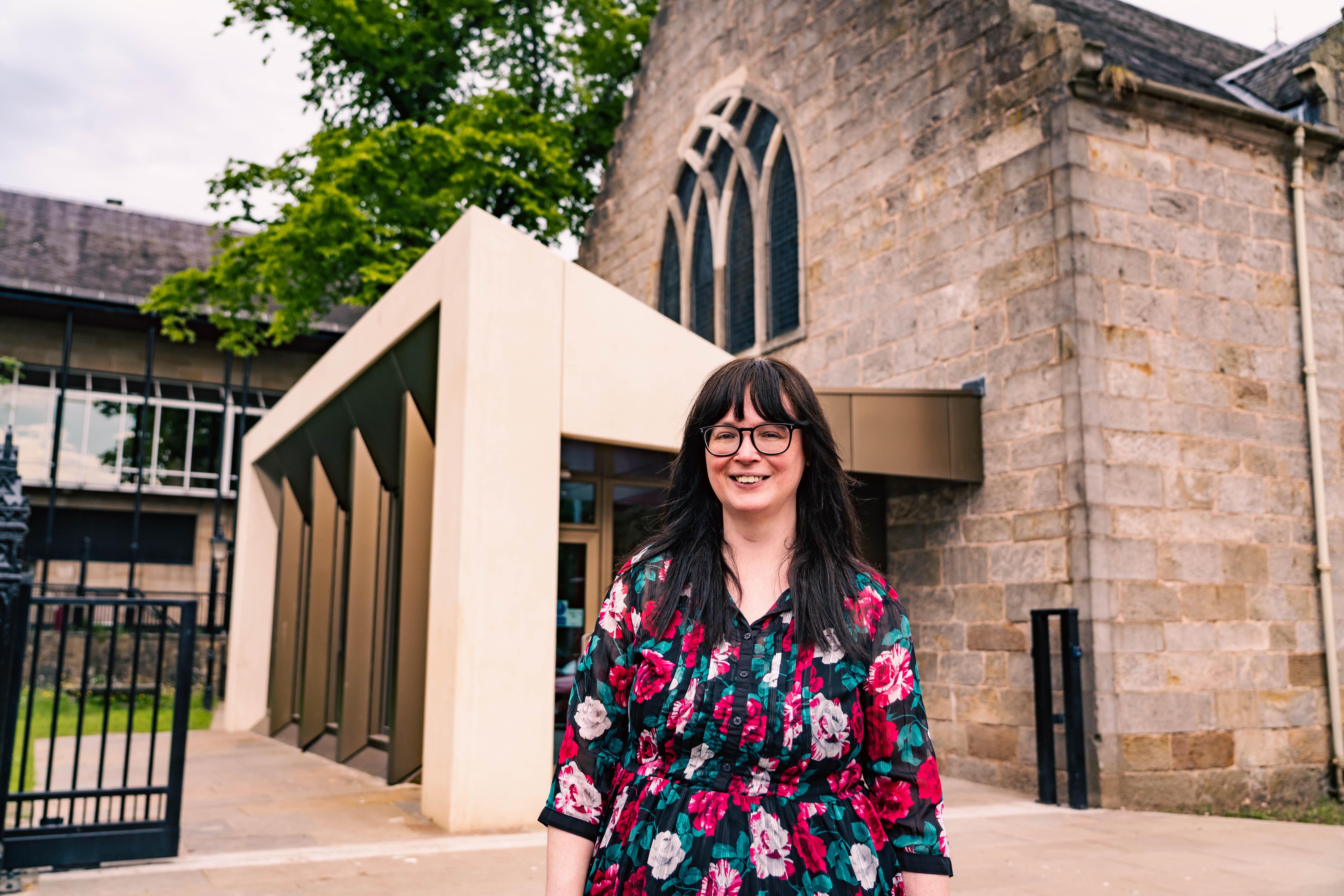Turning the page: Keeping Scotland's libraries open
It’s the Easter holidays and the sun has not yet hit the rooftop patio at Paisley Central Library.
Councillor Lisa-Marie Hughes, chair of Renfrewshire Council’s culture and leisure body OneRen, says it’s too early in the day for that but the space, replete with outdoor furniture, is great for holding events. To get there we’ve already passed by the ground floor children’s area with its climbing wall, play post box and cushion-filled nooks, as well as the coffee machines and armchairs overlooking the town’s High Street in the bay windows of this converted premises.
If it’s not already obvious, this is not your stereotypical library. Once residential and then a retail unit, in previous guises the four-storey site served up women’s clothing, housewares and jewellery but now offers audiobooks, digital classes and book launches. The product of a £7m project, the conversion has created a library which defies expectations and wins design awards, all exposed brickwork and Instagram-friendly pendant lighting.
The result is drawing in users. In the first year of its opening in late 2023 the library, which was previously housed in the nearby museum – itself the subject of an ambitious overhaul – welcomed 115,340 visitors, issued 45,800 books and hosted 290 events.
The shift is part of efforts to revitalise a town centre which has seen footfall dwindle through industrial decline and changing consumer behaviour. There hasn’t been an overnight remedy to that, and units vacated by Marks & Spencer, McDonald’s, The Body Shop and others continue to litter the main shopping street, butterfly bush growing from the rooftops. But traffic through the library doors, which are framed by sculptural whitewashed wood, is five or six times that seen at its previous address, according to Hughes. Today a young child spills out of a lift followed by buggy-pushing parents, students are clustered around tables and a man with a flask taps into his laptop. “We get a lot of people in who work from home,” Hughes says. “The old library was beautiful but old buildings are a barrier for people who don’t see them as being ‘for them’. This is bright and modern – there’s a whole clientele that we didn’t have coming in the door.
“We know that people are coming here and then going to cafes next door, we know parents are coming in and spending two or three hours inside. Generally, people come for a service, but they can hang out – we have lots of places to sit and grab a wee corner. They’re called libraries,” she goes on, “but they are community hubs.”

Indeed, according to the 2023 Scottish Household Survey libraries are the most frequently visited cultural places in the country, with 16 per cent of adults visiting at least once a week, and more than a third visiting at least once a month.
There is cross-party consensus on the value of Scotland’s libraries. Praising the institutions in the Scottish Parliament, many of our MSPs have lyricised about their importance to their own lives. The SNP’s Christine Grahame recalled reading Shakespeare there as a 16-year-old unable to study amidst her four younger siblings in a “cramped council house”; Tory Tim Eagle said his library offered more books “than I could ever provide at home for my young children”; Labour’s Michael Marra presented them as a multi-sensory experience, extolling the “atmosphere, the smell of them and the quiet sounds”. All emphasised their importance to their constituents, with former Labour leader Richard Leonard calling them “a vital part of our children’s education”, a means to “combat digital exclusion and social isolation” and “anchor institutions that can help to stimulate the urban regeneration of our towns and city centres”. “They represent a world beyond the market – a safe, equal, democratic, free space run not for profit but for enlightenment,” he said.
And yet for years now there have been threats to the country’s local networks amidst rising financial pressures which have left town halls to fill black holes in their budgets. The ‘save our services’ campaigns triggered by annual suggestions of cuts and closures are as predictable as the savings options themselves and galvanise communities into the defence of facilities in our villages and towns. This year’s round included, but was not limited to, the closure of seven out of Moray’s 11 sites and the shuttering of a further five in Perth and Kinross.
While those suggestions were not followed through, the regularity with which such measures are mooted is causing serious frustration amongst library professionals. “We can’t go on like this, we can’t have an annual battle” says Sean McNamara, director of the Chartered Institute of Library and Information Professionals in Scotland (Cilips). “We need a long-term approach to funding.
“It’s really, really frustrating. We have a year-on-year picture where libraries are under threat, and they’re used as an example of the difficult position local government is in. We understand councils are in a difficult position. But this causes worry for communities and concern for staff who don’t know how secure their jobs or services are.”
Behind all of this is the fact that library provision is a statutory duty. Alongside considerations under the Equality Act, the Human Rights Act and the UNCRC incorporation act, decades-old local government legislation is in place requiring “the provision of adequate library facilities for all persons resident in their area”. The meaning of exactly what “adequate” really means here, though, lacks the clarity many would like. Green MSP Mark Ruskell has called for a “redefinition of what constitutes statutory library provision, especially in rural areas” against what he says is “a very low bar”.

Public finance minister Ivan McKee has said “library policy is devolved to our local authorities”, and the government will “engage with our local network” on the matter of the definition.
Across Scotland, the national average is 2.04 library branches per 20,000 people, with 1,561 books available for every 1,000 pairs of eyes. More than 40 council libraries have closed since 2014, spread out unequally across the country. In some cases facilities have been taken into community hands, ensuring at least partial continuation of service, but this is by no means universal and in Fife, for instance, five out of 12 closure-hit centres have been kept going by local groups.
These are the most visible signs of strain in our public libraries, but others are happening between the lines, with book funds constrained and staffing budgets reduced. McNamara calls these “cuts by stealth” and says hiring policies that replace specialists with workers who have not been “trained to a certain standard” risks the workforce being “de-professionalised”.
Ensuring staff have the skills to deliver a “progressive library service” is one of the aims listed by the Scottish Library and Information Council (Slic), an independent advisory to the Scottish Government, in its most recent strategy, Forward, which covered the period from 2021-25. The blueprint will be updated for the next parliamentary term and Slic chief executive Alison Nolan says it will build on the “groundbreaking work” carried out over the past four years, including the rollout of a training platform for public library staff, the creation of Lend and Mend hubs at 11 sites and an overhaul of service performance measurement. The next iteration will be a chance to highlight “the amazing contribution libraries are making across all of Scotland’s communities”, she says, emphasising the role libraries play in supporting community cohesion, capacity building and the promotion of positive wellbeing.
McNamara says that contribution is at odds with the yearly resource battle. “There are two stories: one is Scotland’s libraries doing an amazing amount of good for their communities; the other is we have got shrinking budgets and libraries threatened with closure and staff reductions,” he says. “Those two things disagree with each other.”
In Renfrewshire, Hughes has not lost any of her sites this time around. The region’s finances have been shored up by a 9.5 per cent raise in council tax. Preparing for the start of the town’s book festival, she declines to comment on the situation elsewhere, saying, “councils are making difficult decisions and people have different needs in different places, and it’s not up to me what they do”.

Councillor Lisa-Marie Hughes
“We see them as vitally important, and so they remain,” she says of her authority’s centres. “It’s the same reason that after the pandemic we opened up all 12 libraries in the first week we could – because they are community places where people feel safe. Without being political, I also think – not to say the finances aren’t tough in Renfrewshire – but there has been some good financial management in our council that means we haven’t had to make those decisions some other councils have. Would I say no to extra funding? Absolutely not, I would never say no – give me all the money.
“As places have lost libraries, people have seen how vulnerable they are,” she goes on. “You can’t just consider what the building is, you have to consider the library’s place within the community. We have lots of rural communities where it might be one of the few council buildings. If it’s one of your main community hubs that’s important, particularly for connectivity.
“I don’t think a library is just one thing, they are our best asset. Libraries can change lives in a way that no other things do, and generally by people’s choice – borrow what you like, there’s nothing stopping you. You have access to vast swathes of information and ideas and worlds real and imagined, and you can pick whatever you like and take it home with you. They are one of the most democratic things we do.”
Holyrood Newsletters
Holyrood provides comprehensive coverage of Scottish politics, offering award-winning reporting and analysis: Subscribe